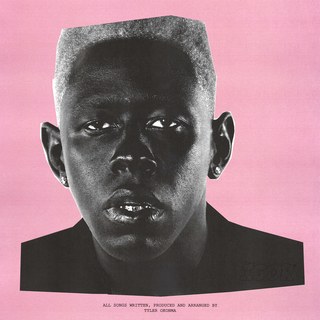How Tyler, the Creator Crafts a Theme of Self-Disgust and Love With IGOR
By Thomas Rodriguez
Tyler, the Creator is not a perfect dude. A brief skim over the fashion and hip-hop icon’s career will reveal quite a lot of flaws in his character: a penchant for anger, loneliness, and the occasional bout of cannibalism (in word, not action) on his older albums. As much as Tyler has evolved from a skateboarding, shock-prone rapper to an alternative R&B powerhouse, there’s always been an underlying feeling of self-inflicted horror in his music. From Bastard to Flower Boy, a feeling of alienation is tangible in Tyler’s every word. On IGOR, Tyler’s latest album, he takes that feeling of alienation and his unique persona to absolute extremes. On one level, it is his prettiest, most light-hearted musical moment, while on the other, it is self-destructive, bleak, and hunched over in its own self-induced agony. Just like the character “Igor,” it is both monstrous and completely human, a true-to-life experience of the tumultuous feelings that accompany love and heartbreak.
Right off the bat, IGOR sounds... off. More than just different, for Tyler’s sake, but uncomfortably clashing within itself. “Igor’s Theme” is a horror-core mix of cybernetic, abrasive synths and Wu-Tang-esque drums, masking a high-pitched and soft-spoken pop melody. It’s almost gross on the surface, only to reveal its subtle prettiness in spare moments of peace. IGOR is steeped in its own clutter, purposefully chaotic throughout. Instrumental and vocal melodies come and go; Tyler’s very voice goes from immaculate to being completely wretched (for better or worse). Complicated feelings of love and self-loathing are planted in your head as you listen. It’s reminiscent of Flower Boy’s more soulful aesthetic, but only after a deeper look, can you notice the pop elements hidden under some of the louder beats included on tracks “New Magic Wand” and “What’s Good;” these are the same Pharrell chord progressions Tyler’s always used. Instead of rejecting his ugliness like he did throughout Flower Boy, he embraces it to explore the battle in his head, as seen here.
If we count the character of Igor (from “Young Frankenstein”) as a base for the album title and character that Tyler creates, the instrumental aesthetic makes sense. Igor is portrayed as deformed and stupid, yet as having a heart of gold. Tyler’s instrumentals here give off that same garish surface-level abrasiveness associated with the character, but the role of hunchback has been passed to Tyler, a man notoriously lacking love in his music. At times he embraces his evil, at times he outright rejects it in favor for the apple of his eye.
The only problem is that what he seeks, that harmonious and perfect companionship that may just reveal his worth, isn’t available for him. His true love is just as horrible as he thinks he is.
“Exactly what you run from, you end up chasing,” Tyler explains on the fourth track of the record, laying the groundwork for the impossibly inconvenient affection he details throughout the album. IGOR is very much successor to Flower Boy, but it’s less of a “lovey dovey” affair but more grounded and brutal. Tyler goes from having his “earth quaked” by his love, to desperately seeking their approval, to having outright disgust with them. It seems that as Tyler grapples with his sense of self, his inner perfection, he completely falls in love with his perfect counterpart only to realize that his own deep-running flaws runs through their veins, too. Tyler spends the whole album running from his IGOR-esque traits, only to run in a complete circle and finish where he started on “GONE, GONE/THANK YOU.” It’s unclear whether what went wrong (as described in this track) was his own fault, or his lover’s fault, but one thing is clear: his own flaws brought him down either way.
Tyler’s music has always been about his imperfect relationship with planet Earth’s inhabitants, and this past leg of his career has explored the effects of his few relationships with others. Even on IGOR, he thinks he is a puppet at the expense of love, endlessly hypnotized by the prospect of finding that one companion that might make him feel complete. Tyler’s lack of self-awareness in terms of his own reflection ultimately leads to his downfall; he tries to convince us of his own worth while failing to recognize that he is giving his counterpart an equal amount of worth. Is it his self-disgust that causes this, or his childlike viewpoint on life, coexistent with the fictional Igor’s worldview? That’s all up to interpretation.
IGOR has many powerful moments, sonically and lyrically, but its defining moment is in its final track: “ARE WE STILL FRIENDS?” This track displays Tyler’s highest point of growth as a person as exhibited throughout his discography. Instead of resorting to his typical coping mechanisms of violence, self-loathing, and well-written slander, he asks a simple question to his mirror image, to the one he once rejected: Can we still be friends? It’s an incredibly mature realization from the Odd Future affiliate, a moment of clarity in his tumultuous mind state that shows that maybe he’s going to accept his “grotesqueness” as his strength, to accept his failures as learning points. Maybe now, Igor can find his piece someday.
